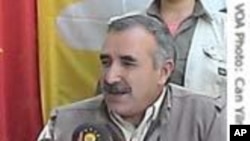<!-- IMAGE -->
Three leaders of the Kongra-Gel terrorist group have been designated drug kingpins by the United States government. The U.S. Department of the Treasury announced October 14 that its Office of Foreign Assets Control has designated Kongra-Gel leader Murat Karayilan and 2 high ranking Kongra-Gel members, Ali Riza Altun and Zubayir Aydar, as significant foreign narcotics traffickers.
Formally known as the Kurdistan Workers Party, the Kongra-Gel was named by the President of the United States as a significant foreign narcotics trafficker under the Foreign Narcotics Kingpin Designation Act on May 30, 2008. The U.S. Department of State has designated the Kongra-Gel as a global terrorist organization. Pursuant to the Kingpin Act, the Treasury Department's designation freezes any assets the 3 designees may have under U.S. jurisdiction and prohibits U.S. persons from conducting financial or commercial transactions with these individuals.
Active in southeastern Turkey and northwestern Iraq, and supported by some of Europe's Kurdish community, the Kongra-Gel was designated as a significant foreign narcotics trafficker for its more than 2 decades-long participation in drug trafficking. The drug trade is one of Kongra-Gel's most lucrative criminal activities. Nearly 300 individuals connected to the Kongra-Gel were arrested on drug trafficking charges from the mid-1980s through the early 1990s, more than half of them in Germany.
Kongra-Gel drug trafficking continues. In 2007 and 2008, Turkish law enforcement seized a number of drug shipments and drug labs that belonged to Kongra-Gel. The Kongra-Gel has also relied extensively on taxing drug shipments that move through its territory.
The Treasury Department's designation, supported by the U.S. Drug Enforcement Administration, is part of ongoing efforts under the Kingpin Act to apply financial measures against significant foreign narcotics traffickers worldwide. Internationally, more than 500 businesses and individuals associated with 82 drug kingpins have been designated pursuant to the Kingpin Act since June 2000.
Penalties for violations of the Kingpin Act range from civil penalties from up to $1.075 million per violation to more severe criminal penalties. Criminal penalties for corporate officers may include up to 30 years in prison and fines up to $5 million. Criminal fines for corporations may reach $10 million. Other individuals face up to 10 years in prison and substantial fines.
The Director of the Office of Foreign Asset Control Adam Szubin put it plainly: "We will continue to aggressively track and expose the Kongra-Gel's financial network to disrupt its trafficking activities."




